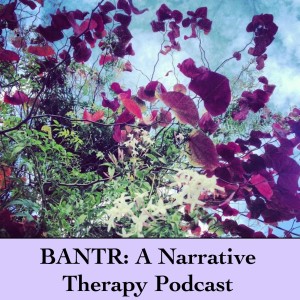Episodes

Monday Jul 11, 2022
Monday Jul 11, 2022
Zemeira Singer, MFT reads her writing “The Game of Life” about her experiences working in community mental health in Alameda County California. We discuss some of the personal, political, and professional dimensions of doing psychotherapy with families living in poverty.
Zemeira currently does psychotherapy in private practice in Berkeley, CA. She works with Adult Individuals and Couples, Children, Teens and Families on a variety of concerns including Adult Relationship Concerns, Blended Family Issues, Parenting Challenges, Teen-Parent Communication Issues, School Related Behavioral Problems and mood and attentional concerns like ADHD, Anger, Depression and Anxiety.
For more information on Zemeira Singer visit her website, new-narratives.com

Sunday Jul 03, 2022
Sunday Jul 03, 2022
Jeffrey Jamerson, MA and Will Sherwin, MFT discuss Mr. Jamerson’s work with:
his history developing Expressive Remix with narrative therapy, expressive arts, and digital media arts with foster youth
the influence of Hip Hop and remix as a metaphor for change work
using digital media to develop pathways out of poverty
Download episode here.
Jeffrey Jamerson, MA in counseling psychology, PhD candidate at CIIS, has worked with foster youth for eighteen years. He is an assistant director of a foster care agency in Southern California. His early work as a filmmaker, DJ, and break-dancer showed him the power of story and creative self-expression. Hoping to create a shift in therapy with children, he has integrated narrative and expressive arts modalities with digital art, which he calls remix therapy. The objective of remix therapy is to re-vision a life story utilizing digital cameras, pictures, music, and voice-over.
Email Jeffrey Jamerson at siddha930@yahoo.com.
Links:
Expressive Remix’s Animated Mask activity
Expressive Remix’s digital story “Fostercare Blues”:
PeersTV interview with Beats Rhymes and Life co-founder Tomas Alvarez III and Domantae Wilson:
Podcast: Play in new window | Download

Sunday Jul 03, 2022
Sunday Jul 03, 2022
On this episode of BANTR Radio, narrative therapists and social workers including Will Sherwin, Zemeira Singer, Scott Ralston, and Terry Becker discuss five songs that are evocative of narrative therapy principles.

Sunday Jul 03, 2022
Sunday Jul 03, 2022
Will Sherwin sat down with Shoshana Simons, PhD, RDT to discuss :
How she got involved with narrative therapy and drama therapy.
How she goes about teaching students in the California Institute of Integral Studies (CIIS) Expressive Arts Therapy Program.
Her work using the Tree of Life and her newly co-developed “Laundry of Life”.
What keeps us inspired.
Shoshana Simons PhD, RDT is Chair of CIIS’s Expressive Arts Therapy Program. Shoshana has a rich background in integrating performance and expressive arts structures into multiple contexts of work with children and adults in educational, therapeutic and larger systems.
Over the last several years, Shoshana has focused on developing an expressive arts-centered approach to narrative therapy. In particular, she has co-developed an innovative narrative collective practice with EXA faculty member, Danielle Drake Burnette called “Laundry of Life” which they have been using locally and globally with groups and communities facing serious life issues and challenges.
Shoshana’s current interests include: narrative expressive arts therapy practices, the use of expressive arts modalities for promoting and maintaining mental health for therapists and human service workers, the role of expressive arts in leadership & social change, and arts-based research methods, especially Cooperative Inquiry methodology. Her personal arts practices include improvisational theater, sacred chanting, creative writing and poetry. She’s currently learning to play the didgeridoo. She is particularly interested in creating opportunities for students in the Expressive Arts Therapy program to be of joyful, creative service to under-served populations in the San Francisco Bay Area.

Friday Jul 01, 2022
Friday Jul 01, 2022
For the first episode, Will Sherwin, LMFT compiled a list of quotations that have been helpful in his work. He discussed these quotations with BANTR co-organizer and co-instructor, Julia Wallace, LCSW, a narrative therapist in private practice in San Francisco. For more information on Julia Wallace go to juliawallace.com
Quotations:
1) “People are profoundly influenced by the discourses around them.” — AATBS Study Guide for 2010 MFT licensing exam.
2) ” …the postmodern argument is not against the various schools of therapy, only against their posture of authoritative truth.” — Kenneth Gergen
3) “Therapy tends to privilege the individual rather than the set of relationships in which that individual lives.” — Kenneth Gergen
4) “Where there is power, there is resistance.” — Michel Foucault
5) “The narrative approach is characterized by an unshakable belief in the incomplete nature of all oppressions.” — John Winslade and Lorraine Hedtke, Narrative Therapy in Practice: The archaeology of hope.
6) “All of us are weirdly-abled.” — Stephen Madigan and David Epston
7)
What is the theory of change from this narrative perspective? One of my responses would be that the rich development of a subordinate storyline provides a foundation for people to address the problems and predicaments of their life. It makes it possible to engage in actions that are healing in response to the traumas of their past. It is this rich story development that provides that foundation. People become aware of some actions they could take that would be more in harmony with what they’re learning about what’s important to them, about what they give value to, and about what they intend for their life.
It’s through this rich story development that some of these other conclusions become more visible and become more influential in the shaping life. There’s quite a focus on establishing a context in which people are able to give voice to what it is they do give value to that’s been continuous through their live; that’s represented in a range of responses to their predicaments. And what it is that people intend for their lives. It’s the rich development of these conclusions about one’s intentions and what one gives value to that provides a wonderful foundation for people to proceed with their life. Suddenly people become aware of a whole range of options that would be in harmony with what they give value to and what they intend for their life.
— Michael White, Trauma and Narrative Therapy Part 1, 27 min.
8) “. . . restoring the dignity and honor of young people and their families.”
“. . . shame, indignity, and dishonor dissolve in rich stories.”
— David Epston
Recorded in Summer 2014

